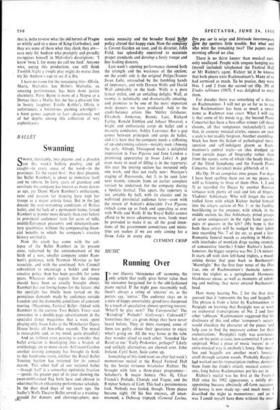BA LLET
Swanning
C WANS, inevitably, two pigeons and a phoenix a are this week's balletic poultry, and all caught—in every sense of the word—in the provinces. To the rarest first : that dear phoenix, the Ballet Rambert, is about to immolate itself and be reborn. In forty years of grandeur and servitude the company has known as many downs as ups, yet Dame Marie Rambert's enthusiasm, taste and passion for dancing have kept her troupe as a major artistic force. But in the last decade the ever-worsening conditions of British ballet, and the lack of a permanent home, forced Rambert to pander more directly than ever before to provincial audiences' taste for acres of tulle, middle-European peasantry and nineteenth-cen- tury quaintness, without the compensating finan- cial benefits to which the company's creative history entitled it.
Now the crash has come with the col- lapse of the Ballet Rambert in its present state, redeemed by the announcement of the birth of a new, smaller company under Ram- bert's guidance, with Norman Morrice as her associate, and with the continued Arts Council subvention to encourage a bolder and more creative policy than has been possible for some years. Whatever one's regrets that the change should have been so cruelly brought about, Rambert has our loving hopes for the future; afid the spotlight has finally been turned on the pernicious demands made by audiences outside London and the damnable conditions of constant touring. (Meantime, Festival Ballet—linked with Rambert in the curious Two Ballets Trust—can announce in a double-page advertisement in the specialist dance magazines that a week spent playing only Swan Lake at the Manchester Opera House broke all box-office records. The moral is inescapable and, to my mind, quite dreadful.) And so, without even pausing to consider that ballet criticism is developing into a branch of ornithology, on to more swans. At Covent Garden another touring company has brought its birds to this handsome roost, whither the Royal Ballet Touring Section has returned for its annual season. This other half of our national ballet —though 'half' is a somewhat optimistic fraction —spends the greater part of its year showing the swan-emblazoned flag both here and .abroad in what must be an exhausting performance schedule. In the dear dead days of ten years ago, the Sadler's Wells Theatre Ballet served as a training- , Koutid for dancers and choreographers; eco- nomic necessity and the broader Royal at policy altered that happy state. Now the company is Covent Garden on tour, and its direchir, John Field, has splendidly contrived to maintain proper standards and develop a lively troupe and fine leading dancers.
Last week's opening performance showed both the strength and the weakness of the section; on the credit side is the original Petipa/Ivanov Swan Lake, untouched by the fumbling hands of improvers, and with Doreen Wells and David Wall admirably in the leads. Wells is a pure lyrical stylist, and an unfailing delight; Wall, at twenty, is technically and dramatically amazing, and promises to be one of the most important male dancers we have produced. Add to the credit-balance artists like Shirley Grahame, Elizabeth Anderton, Brenda Last, Richard Farley, Ronald Emblen and Johaar Mosaval, a bright and enthusiastic corps de ballet and a masterly conductor, Ashley Lawrence. But a gap comes between principals and corps de ballet, and it is here that the company needs a stiffening of up-and-coming soloists—notably men. (Among the girls, Alfreda Thorogood made a delightful impression in Two Pigeons and Jane Landon a promising appearance in Swan Lake.) A gap even more in need of filling is in the repertory; this year the touring section has mounted only one work, and that not really new: Nureyev's staging of Raymonda, Act 3, to be seen later next month, remains from an earlier complete version he undertook for the company during a Spoleto festival. This apart, the repertory is too amiable by half, with its classics and its well-tried provincial audience lures—even with the return of Ashton's delectable Two Pigeons (which came up as fresh and appealing as ever with Wells and Wall). If the Royal Ballet cannot afford to be more adventurous now, funds must be provided to make it so; all the good inten- tions of the government committees and minis- tries are useless if we are only aiming for a Swan Lake in every city.
CLEMENT CRISP














































 Previous page
Previous page